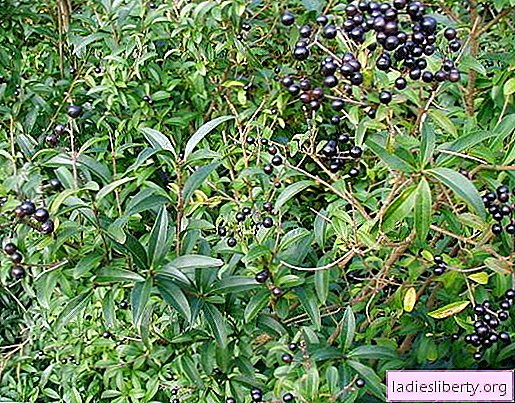
Biryuchina - general description
Privet, or as the wolfberries say, is a tree deciduous or evergreen shrub. Its leaves have a simple, oblong shape, dark green in color. Small fragrant white flowers form paniculate or raceme-shaped inflorescences.
The plant produces blue-black fruits that ripen from September to October. Certain plant species can reach a height of about five meters. The plant is also characterized by rapid and active growth.
Privet consists of many useful substances. This tannin, phenol, resin, syringoside, vitamin C, vegetable alkaloid, sugar, carotenoid, flavonoid, essential oils, glucosides, cyanidine rutinosides, malvidin glucosides, fatty oils.
Biryuchina - types and places of growth
About fifty species belong to the genus privet. East Asia, southern Russia, southern Europe, North Africa and Asia Minor are the places where this plant is distributed. The most popular types of plants are:
- Common privet is a densely branched shrub with shiny, berry-like, poisonous fruits. The plant can grow on any soil with the exception of a very acidic peat substrate.
- Oval leaf privet is an evergreen non-flowering tree.
- Japanese privet has a lot in common with shiny privet. It is an evergreen shrub, demanding on soil moisture.
- Brilliant privet is a large, evergreen shrub that blooms for three months. Gives small fruits of dark blue color. Very fast growing.
- Amur privet is a deciduous shrub with black fruits with a waxy coating.
- Privet Ybota is a deciduous light-loving shrub. Very demanding on the soil.
- The Jesuit privet is a shade-tolerant winter-hardy shrub with small, hard leaves.
- Privet Quihou is a medium-growing shrub.
- Dense privet is a semi-evergreen medium-growing shrub.
- The sharpest privet is a medium-growing shrub.
Biryuchina - healing properties
Decoctions and tinctures from privet effectively cope with diarrhea and metrorrhagia, pneumonia and chronic bronchitis, have a hemostatic effect, treat laryngitis and stomatitis, inflammation of the uterine appendages, tonsillitis, granular pharyngitis, cardiovascular diseases. They have cardiotonic and hypotensive properties.
Privet also has antiviral, bactericidal, protistocidal and phytoncidal effects on the body. Moreover, impaired vision, weakness in the lower back and knees, dizziness, tinnitus, increased immunity, earlier graying of hair - privet fights all this.
Privet - dosage forms
The healing properties of the leaves, flowers, fruits and bark of the plant, collected in dry weather. Only ripe dried fruits are used. Tinctures and decoctions are prepared from this raw material.
Privet - recipes
Official medicine does not use the medicinal properties of privet. At home, you can independently prepare decoctions and tinctures.
For the treatment of inflammatory processes in the oral cavity and throat, it is necessary to gargle with tincture of two teaspoons of dried leaves and flowers drenched in a glass of boiling water.
To prepare a laxative decoction, boil over a small fire one teaspoon of the fruit with one glass of water.
Privet - contraindications
Despite all the useful properties of privet, its use must be treated very carefully. Indeed, in almost all parts of the plant, especially in the fruits, there are plant alkaloids, which, once in the body, can provoke very severe poisoning.
Comments











